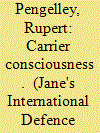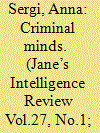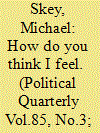|
|
|
Sort Order |
|
|
|
Items / Page
|
|
|
|
|
|
|
| Srl | Item |
| 1 |
ID:
136459


|
|
|
|
|
| Summary/Abstract |
When Britain entered the First World War it did so as an especially hesitant belligerent. One month later, the British enthusiastically signed the Treaty of London, stating that the Entente powers would prosecute the war in common and that none would pursue a separate peace. Why would a state long known for jealously guarding its ability to maintain a free hand initiate a binding alliance that restricted its war termination prospects after one month of combat? And what were the effects of its decision to do so? Answering this question requires not only that we examine British decision making but that we understand No Separate Peace Agreements and why states sign them. I hypothesize that a state will initiate a No Separate Peace Agreement when it has reason to fear that one of its cobelligerents may defect. I also hypothesize that No Separate Peace Agreements will cause states to reconcile war aims with their allies, agreeing to different terms of peace than might have been necessary to satisfy any one of them individually. Using new archival documents, I analyze a case study of British decision making in the early weeks of World War I and find substantial support for the hypotheses.
|
|
|
|
|
|
|
|
|
|
|
|
|
|
|
|
| 2 |
ID:
135345


|
|
|
|
|
| Summary/Abstract |
It is widely recognised that the Anglo-American ‘special relationship’ fluctuated following the Second World War. A “Persistent rivalry” was especially evident in policy towards the Middle East and its oil. Immediately after the war, the American attitude to Palestine seemed to complicate British policy. Events in Iran also reflected the clash between the British imperative to protect its national and imperial interests in the region on the one hand, and the American preoccupation with the Cold War and containment on the other. The subsequent differences over Egypt/ Nasser are a matter of public record as are the problems which arose over the British withdrawal from “East of Suez”. Perhaps the very closeness of the relationship between the UK and the US served to heighten expectations.
|
|
|
|
|
|
|
|
|
|
|
|
|
|
|
|
| 3 |
ID:
135136


|
|
|
|
|
| Summary/Abstract |
In 2007 the five recognized nuclear-weapon states convened for the first time to examine what nuclear transparency and confidence-building measures they could jointly pursue. The P5 process,^sup 1^ as it came to be known, was born in a nuclear policy environment vastly different from the one that prevails today.
It was established as a result of an initiative from the United Kingdom, which was eager to reverse the stagnation it sensed in the nuclear-weapon states' progress toward meeting their disarmament commitments under the nuclear Nonproliferation Treaty (NPT). In June 2007, UK Foreign Secretary Margaret Beckett argued for the need to "engage with other members of the P5 on transparency and confidence-building measures," as well as to involve them in the testing of future verification regimes.
|
|
|
|
|
|
|
|
|
|
|
|
|
|
|
|
| 4 |
ID:
135891


|
|
|
|
|
| Summary/Abstract |
In June 2014, the think tank IPPR published a report, The Condition of Britain, widely seen as important source material for Labour as the party geared up for the 2015 General Election. This is an echo of another report—that of the Commission on Social Justice, published in 1994—which also made an important contribution to the thinking of Labour in opposition. A comparison between the two documents provides insights into the evolution of mainstream progressive thought over the past twenty years.
|
|
|
|
|
|
|
|
|
|
|
|
|
|
|
|
| 5 |
ID:
135137


|
|
|
|
|
| Summary/Abstract |
Iran’s persistent expansion of its uranium-enrichment program and its covert construction of an underground gas-centrifuge enrichment facility at Fordow have contributed to concerns that Tehran harbors nuclear weapons ambitions. Arrangements for constraining Iran’s ability to use its declared enrichment facilities for nuclear weapons programs are a particularly controversial element in the ongoing multilateral negotiations over Iran’s nuclear program.
Much of the discussion about Iran’s potential production of highly enriched uranium (HEU) for use in nuclear weapons has focused on its three previously secret enrichment facilities that now are under International Atomic Energy Agency (IAEA) safeguards. The concern is that Iran could use these facilities to produce HEU, perhaps after withdrawing them from safeguards.
|
|
|
|
|
|
|
|
|
|
|
|
|
|
|
|
| 6 |
ID:
136154


|
|
|
|
|
| Summary/Abstract |
In the UK the rules governing caretaker situations have historically been underspecified. The UK's constitutional traditions, such as prime ministerial discretion to time elections and its two-party system, have in the past limited the frequency and duration of caretaker periods. However, the recently lengthened election timetable, new constraints on the executive introduced by the Fixed-term Parliaments Act (2011), and a decline in the dominance of the two largest parties are raising the risk that the UK will experience caretaker periods more often and for longer stretches of time. In this paper, we offer an analysis of the UK's current caretaker provisions and conclude that the existing conventions are insufficiently detailed and can render such periods problematic and controversy-prone. Important lessons, we suggest, can be learned from reforms in other Westminster systems, and from the caretaker rules of other countries.
|
|
|
|
|
|
|
|
|
|
|
|
|
|
|
|
| 7 |
ID:
135554


|
|
|
|
|
| Summary/Abstract |
What the British historian Eric Hobsbawm called “the long 19th century” ended 100 years ago, in 1914, in Sarajevo, with the two pistol shots that sparked World War I. Another historian, Fritz Stern, described that war as “the first calamity of the 20th century … the calamity from which all other calamities sprang.” These disasters included the Great War itself, which claimed some 20 million lives, including victims of the new century’s first genocide, in Turkey; the October Revolution in St. Petersburg, which gave birth to an ideological empire that would kill tens of millions of people and imprison hundreds of millions more; the rise of Nazism out of Germany’s defeat; World War II, with another 60 million deaths, including genocide on an unprecedented scale; the upheavals and wars beyond the borders of Europe that followed the end of colonialism; and the division of the postwar world into two nuclear-armed camps, which fought each other through proxies in post-colonial lands.
|
|
|
|
|
|
|
|
|
|
|
|
|
|
|
|
| 8 |
ID:
135890


|
|
|
|
|
| Summary/Abstract |
The British National Party and English Defence League forged new frontiers in British political spaces in relation to anti-Islam, anti-Muslim ideologies. Whereas the former sought to do so in formal political arenas, the latter did so as a street-level movement. With the subsequent waning of both, Britain First has emerged seemingly to fill the political void they left. In many ways, Britain First combines the strategies and actions of the parties that preceded it, at both the formal and street levels. This article considers what is known about Britain First, about its history, development and its ideology, and how this is manifested in terms of its political strategies and actions. This includes such activities as standing for European elections and also undertaking ‘Christian patrols’ and mosque ‘invasions’. The article considers how Britain First, while having some similarities with the BNP and EDL, is more confrontational and militaristic and is informed by apocalyptic Christianity.
|
|
|
|
|
|
|
|
|
|
|
|
|
|
|
|
| 9 |
ID:
135822


|
|
|
|
|
| Summary/Abstract |
This article examines a secret Anglo-American programme, Project ‘E’, which equipped the RAF’s V-bomber Force with US nuclear weapons for use in wartime. It shows Project ‘E’ was ineffective as a warhead supply programme and, furthermore, that it crippled the operational effectiveness of the V-bomber Force as a whole between 1958 and 1962. This article argues that as a result of Project ‘E’, the V-Force was neither operationally nor politically independent as a nuclear deterrent force. This challenges the traditional view of the V-Force as the benchmark of nuclear independence to assess the Skybolt, Polaris and Trident programmes.
|
|
|
|
|
|
|
|
|
|
|
|
|
|
|
|
| 10 |
ID:
136005


|
|
|
|
|
| Summary/Abstract |
The UK’ s return to a true aircraft carrier capability open up new opportunities and challenges if the RN is to be able properly to exploit the potential of the carrier and its strike components. Rupert Pengelley explore current plans and preparations.
|
|
|
|
|
|
|
|
|
|
|
|
|
|
|
|
| 11 |
ID:
135514


|
|
|
|
|
| Summary/Abstract |
In hindsight, it is evident that the decade of the 1930s was full of ominous foreshadowing. It began with the London naval disarmament conference in 1930, and ended with the Nazi invasion of Poland in September 1939 the marked the onset of World War- II
|
|
|
|
|
|
|
|
|
|
|
|
|
|
|
|
| 12 |
ID:
136369


|
|
|
|
|
| Summary/Abstract |
Law enforcement authorities are increasingly turning to behavioural sciences to help with the fight against organized crime. Drawing on research conducted with the UK National crime agency, Ann Sergi examines how this new approach is being put to practical use.
|
|
|
|
|
|
|
|
|
|
|
|
|
|
|
|
| 13 |
ID:
135366


|
|
|
|
|
| Summary/Abstract |
Recent events in Syria and Iraq have shown in horrifying starkness the increased participation of British jihadists in terrorist fighting in the Middle East. In response, many have called for increased measures against home-grown radicals, to prevent them from travelling abroad to fight for the Islamist cause and, crucially, to stop them from carrying out attacks upon their return. Raffaello Pantucci analyses the difficulties of identifying potential terrorists among the many individuals who move within radical Islamist circles, and the even more challenging task of pinpointing those susceptible to self-radicalisation who could, without direct guidance, carry out dangerous acts of lone-actor terrorism
|
|
|
|
|
|
|
|
|
|
|
|
|
|
|
|
| 14 |
ID:
135198


|
|
|
|
|
| Summary/Abstract |
In the concluding pages of his fascinating memoir, War Comes to Garmser, Carter Malkasian, a Pashto-speaking U.S. diplomat who was stationed in a volatile region of Afghanistan in 2009–11, voices a fear shared by many of the Westerners who have participated in the Afghan war during the past 13 years: "The most frustrating thing about leaving Garmser in July 2011 and now watching it from afar is that I cannot be certain that the [Afghan] government will be able to stand on its own. ... The British and the Marines had put the government in a better position to survive than it had enjoyed in the past. What they had not done was create a situation in which the government was sure to win future battles against Taliban [fighters] coming out of Pakistan."
|
|
|
|
|
|
|
|
|
|
|
|
|
|
|
|
| 15 |
ID:
136312


|
|
|
|
|
| Summary/Abstract |
The green deal provided a framework of accredited market participants, through which people pay for some of the cost of improving their homes and businesses using a type of loan which is paid back with the savings they can expect to make on their fuel bills. By 2020 the green deal and eco could save UK homes and businesses 4.5 MtCO2 per year, while helping millions to improve the comfort of their homes and control rising energy bills.
|
|
|
|
|
|
|
|
|
|
|
|
|
|
|
|
| 16 |
ID:
135885


|
|
|
|
|
| Summary/Abstract |
Current debates around immigration are informed by hierarchies of belonging, with some groups seen to belong more, and therefore deserve more, than others. This link between belonging and entitlement has been predominantly analysed in relation to struggles over access to key material benefits, such as jobs, housing, healthcare and so on. This paper will argue that these struggles also point to the continuing relevance of nationhood to many people's sense of self, community and place and the value that comes from being positioned, and recognised, as part of a group that lies at the heart of national life and culture. In other words, the ‘politics of immigration’ is about the anxieties and concerns of those who no longer feel ‘at home’ in what they consider to be ‘their’ country.
|
|
|
|
|
|
|
|
|
|
|
|
|
|
|
|
| 17 |
ID:
135371


|
|
|
|
|
| Summary/Abstract |
In May 2009, Lieutenant Mark Evison, of the 1st Battalion Welsh Guards, was shot in the shoulder during an ambush on his platoon while on patrol in the Nad-e Ali district of Helmand Province, Afghanistan. Three days later, having first been flown to Camp Bastion for emergency surgery and then to the UK for further treatment, he was declared brain dead and his family switched off his life-support machines. In this article, Lieutenant Evison's mother provides a very personal reflection on the extremely difficult period following his death, recalling her impressions of the support provided to the platoon members, and the legal process that followed in the form of the coroner's inquest.
|
|
|
|
|
|
|
|
|
|
|
|
|
|
|
|
| 18 |
ID:
135337


|
|
|
|
|
| Summary/Abstract |
Alexander Dugin, the well-known public philosopher, entered Russia's intellectual and political life in the 1990s, with strongly anti-American and often anti-Western statements. Dugin's philosophy, especially in its early version, was of great use for foreign analysts with its emphasis on the irreconcilable conflict between the Eurasian civilization – with Russia in its centre – and the Atlanticist civilization led by the United States. While the image of Atlanticism and Americanism as despiritualizing forces ready for global predominance emerged in Dugin's work early on, it was later supplemented by another image, stressing Atlanticism as a desire to play God, to change the nature and the man himself. Consequently, Atlanticism and Americanism cannot live in peace until the Eurasian civilization is destroyed completely. While geopolitical Duginism of the 1990s had few direct translations into actual Russian foreign policy, it had an indirect relationship to Putin's posture in Crimea and Ukraine, and on the economically centred Eurasian Union. The importance of Duginism in the minds of segments of the American and British leadership is due, rather, not so much to the danger of an aggressive Russia, but to the waning of Washington's influence in Europe. Duginism is less a manifestation of Kremlin policy, than an ideological construction mostly belonging in the past. Instead, pragmatic nationalists are the most influential people in the present-day Russian elite.
|
|
|
|
|
|
|
|
|
|
|
|
|
|
|
|
| 19 |
ID:
134274


|
|
|
|
|
| Summary/Abstract |
This article discusses the visit of James Richards, President Eisenhower's special emissary to the Middle East, to Iraq in April 1957 following the pronouncement of the Eisenhower Doctrine. An analysis of the Richards Mission encompasses a range of specific issues, including the relationship in Iraq between the US and UK and American assessments of the stability of the Iraqi government. Moreover, this article examines the American strategy for navigating the rising tide of Arab nationalist sentiment in Iraq after the Suez War. This article explores the ways in which US policy-makers privileged the notions of ‘stability’ and ‘order’ in Iraqi political affairs and reflects on the critical dilemmas and contradictions underlying American policy towards Iraq and the Middle East after the 1956 Suez War.
|
|
|
|
|
|
|
|
|
|
|
|
|
|
|
|
| 20 |
ID:
134541


|
|
|
|
|
| Summary/Abstract |
The September 2014 referendum is a milestone in Scotland’s history. After 307 years of union with England and a 15-year experience with devolution, Scottish nationalism is within reach of its ultimate goal. Independence would be consensual and Scotland and the rest of the UK would retain multiple links. The EU dimension looms large in the debate and is entangled with the UK’s own review of its membership. Scotland’s referendum is part of a wider trend seeing other ‘stateless nations’ in the democratic world pursuing independence. Even if opinion polls indicate voters will likely reject secession, Scotland’s experience holds important lessons for the wider world.
|
|
|
|
|
|
|
|
|
|
|
|
|
|
|
|
|
|
|
|
|